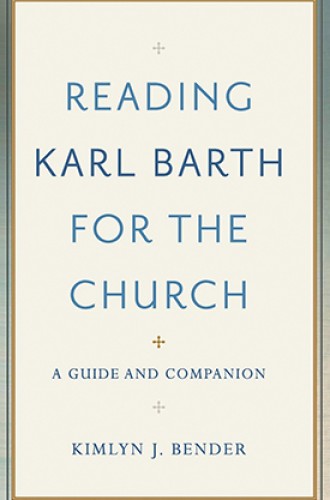Karl Barth’s gift to the church
Kimlyn Bender has produced a reading guide to assist nonspecialists.
Surely no great Christian theologian exceeds Karl Barth in devotion to the church and its pastors. Kimlyn Bender shares a remark from late in Barth’s life: “My whole theology, you see, is fundamentally a theology for pastors.” Barth was a pastor for ten years, and the whole point of theological analysis, he wrote in his Church Dogmatics, is “self-examination,” by the church, “in respect of its proclamation.” Pastors are preachers, for whom such a perspective seems tailor-made.
But Barth’s scholarship—his gift precisely to preachers—is both long and difficult. The first and shortest of the four volumes of Church Dogmatics comes, by itself, to 1,500 densely covered pages. Before that two-part volume appeared in the 1930s, Barth had, with an eye on German Christianity’s complicity in its country’s World War I aggression, written an equally demanding 500-page commentary on Paul’s letter to the Romans. How can anyone with a hurried life even begin to take advantage of such a gift?
Read our latest issue or browse back issues.
Bender, with a view to “the contemporary church and its life,” has produced a reading guide to assist those who are not Barth specialists. In the introductory chapter he notes, as others have, that Barth is like the composer who announces a piece’s theme or themes at the start, follows up with more detailed theme development, then returns to the beginning for recapitulation. This insight provides helpful orientation for anyone negotiating such a formidable body of work.
It also justifies Bender’s decision to focus on the first volume of Barth’s magnum opus: the prolegomena, the critical introduction to the work. Along with the whys and hows of his thought process, Barth introduces in this volume the main themes of his entire vision. As Bender explains, if you can “read the first volume, you are well prepared to read the others.”
Bender remarks early in the book that Barth’s analysis is often dialectical. The word suggests a kind of give-and-take, and Bender explains that Barth uses dialectical thinking to address unavoidable complexity. When different aspects of some Christian claim conflict with or even contradict each other, Barth holds them both in tension. Divine freedom, for example, seems to conflict with human freedom. Dialectical thinking gives both their due, yet withholds from both such mastery as would eliminate the other. A certain mystery remains, and “in order to give proper witness to the reality itself,” it must remain.
After the introductory chapter, Bender turns to Barth’s perspective on dogmatics, his term for the activity of theology as a service to, for, and of the church. Dogmatics is the church examining itself. Christian words, whether from current proclamation or from creeds and confessions of the past, are fallible—truly human, that is, and without “divine status.” They deserve respect yet always stand under the authority of divine revelation through Jesus Christ, the Word of God. God in Christ is the ultimate measure of both truthfulness and faithfulness in Christian life.
That is why proper dogmatics always proceeds in deference to the Reformation “scripture principle.” Although it acknowledges that understanding comes from other sources, including official church teaching, it bends the knee to none of these. The Bible is where Christ’s voice is heard anew, and its message must be the “norm and judge” of all that Christians ask or declare. Barth, Bender tells us, is a “Christocentric theologian.”
As for preaching and the sacraments, both involve human words that announce the divine promise and purpose. Yet both are true only insofar as they reflect the truth revealed by Jesus Christ. They require, therefore, constant struggle against “self-deception,” which entails continually turning to scripture as the canon, or criterion, of all that we say concerning God.
But the struggle also entails recognition that even scripture points beyond itself to the “final and perfect fulfillment” of God’s revelation. In Christ alone is the essence—the “being,” as Barth puts it—of the church. For true knowledge of God and of our proper response to God, the kind of reliance on subjective experience that is exemplified in Friedrich Schleiermacher and much of liberal Protestantism falls disastrously short.
Bender devotes three chapters to Barth’s understanding of the Trinity. The incarnation, which is God’s presence on earth in human form, demonstrates divine freedom and faithfulness and provides definitive knowledge of God’s identity. Against the sheer hegemony of natural and historical science, the incarnation must be taken, therefore, as a given for Christian faith.
But if Christ is the content of revelation, the Holy Spirit—God’s presence to human hearts and minds—brings about its effect, its reception in lives that would be otherwise uncomprehending. God thus has a “three-fold mode of being,” as Barth puts it: Father or creator, Son or revealer, and Spirit or ongoing presence. This has nothing to do with tritheism; Christians worship one God.
Bender’s final two chapters provide arresting examples of Barth’s dialectical or yes-and-no thinking process. Yes, scripture comes from God, but no, it is not timeless or inerrant. Whether in respect of history, science, or even theology, its human authorship entails human fallibility. Yet fallible human speech does, by God’s grace, communicate the perfection of God’s self-disclosure in Christ. That fact—and the criterion it suggests for addressing shortfalls—makes the Bible “the Word of God.”
When in the last chapter Bender returns (with Barth) to preaching as the reason for the work of theology, yes-and-no is apparent again. Yes, “God’s own proclamation” (Barth’s words) takes place in the act of preaching. No, the human words are not free from flaws and sin. They require, besides divine mercy, constant testing. Nevertheless, the Spirit does make these words an “event” in which God truly “encounters” people.
As his own book closes, Bender expresses the hope that readers will continue to learn from Barth. As I read Bender’s book, I also read the first volume of Church Dogmatics. Thanks to both books, I plan to learn more—and my effort will be more productive now. The church’s present vulnerabilities make it more urgent too.






